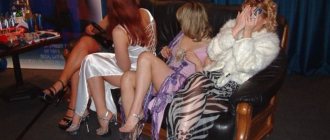1. Causing property damage to the owner or other possessor of property by deception or abuse of trust in the absence of signs of theft, committed on a large scale, -
shall be punishable by a fine in the amount of up to three hundred thousand rubles, or in the amount of the wages or other income of the convicted person for a period of up to two years, or by forced labor for a term of up to two years with or without restriction of freedom for a term of up to one year, or by imprisonment for a term of up to two years. years with a fine in the amount of up to eighty thousand rubles or in the amount of the wages or other income of the convicted person for a period of up to six months or without it and with restriction of freedom for a period of up to one year or without it.
2. The act provided for in part one of this article:
a) committed by a group of persons by prior conspiracy or by an organized group;
b) causing particularly large damage, -
shall be punishable by forced labor for a term of up to five years, with or without restriction of liberty for a term of up to two years, or by imprisonment for a term of up to five years with a fine in the amount of up to eighty thousand rubles or in the amount of the wages or other income of the convicted person for a period of up to six months, or without it and with or without restriction of freedom for a term of up to two years.
- Article 164. Theft of items of special value
- Article 166. Wrongful seizure of a car or other vehicle without the purpose of theft
Concept and signs
The crime prohibited by Article 165 of the Criminal Code of the Russian Federation is causing property damage to the owner of the property (for example, its owner).
Signs of a crime under Art. 165 of the Criminal Code of the Russian Federation:
- Method of commission: deception or abuse of trust.
In paragraph 2 of the Russian Federation PPVS dated November 30, 2017 N 48, deception is defined as a conscious lie, that is:
- the person must be aware that the information, the information that he reports is false and does not correspond to reality;
- or a person may withhold (again, deliberately) true information in whole or in part;
- or a person commits such actions (commits them intentionally) that help him deceive, that is, mislead the other party - the owner (for example, owner) of the property. Such actions could be, for example, falsification of payment documents, cash transactions, and so on.
Paragraph 3 of the said PPVS of the Russian Federation reveals the concept of abuse of trust.
We are talking about abuse of trust as a method of committing a crime when a person realizes that he has established a trusting relationship with a potential victim (owner, owner of property), and they could have developed both as a result of close personal communication, and as a result of official or work relationships . The person obviously understands and realizes that he will not be able to fulfill the obligations that he assumes; moreover, he is not going to fulfill them.
- Another important sign that characterizes the infliction of property damage to the property owner is the large amount of this damage.
In accordance with Part 4 of the note to Article 158 of the Criminal Code of the Russian Federation, large size refers to the value of property exceeding 250 thousand rubles.
- The key feature that characterizes this act is the absence of signs of theft.
That is, by causing damage, a person does not intend to seize property or turn it to his own benefit or to the benefit of other persons.
Let's look at an example.
Rezvykh V.V. asked his old acquaintance - the director of a limited liability company - to lend him money.
In order to accurately receive funds, Rezvykh V.V. offered to provide collateral - his car. Did he say that the car was already pledged to the bank? Of course not, because in this case he risked not receiving the borrowed funds.
Naturally, he was unable to return on time the money that his acquaintance provided him in accordance with the loan agreement. Therefore, the Leninsky District Court of Nizhny Novgorod recognized Rezvykh V.V. guilty of committing the crime in question.
Important point
From a legal point of view, illegal actions accompanied by abuse of trust or deception towards any person cannot be called fraud, unless they entail theft of property causing damage. Those cases where someone else's property obtained by fraudulent means is subsequently retained by force also do not fall under this category of crimes. For example, an attacker asked a passerby for a cell phone in order to make a very important call. Having received a mobile phone, he immediately disappears in an unknown direction. According to the Criminal Code, this crime is regarded as robbery. If property falls into the hands of an attacker through threats against the owner, then this “Fraud” (Criminal Code of the Russian Federation) indicates that the criminal act is considered completed from the moment when the attacker begins to calmly dispose of the appropriated property or the rights to it.
Corpus delicti
The corpus delicti includes the following elements:
- An object.
That is, the social relations at which the encroachment is directed (or in relation to which the threat of such an encroachment is created).
The object of the crime prohibited by Article 165 of the Criminal Code of the Russian Federation is property relations, that is, harm is caused to the rights and legitimate interests of participants in civil transactions.
- Objective side.
The “external side” of the crime, action, socially dangerous consequences, as well as the cause-and-effect relationship between them (note that the last two elements are included in the objective side of the material elements, but not the formal ones).
Since this composition is material, the objective side includes such elements as:
- An action or inaction, which in its essence can be anything.
- A socially dangerous consequence, which is expressed not just in damage, but in damage on a large scale, that is, damage to property must exceed 250 thousand rubles. Such damage can be expressed not only in the form, for example, of direct damage to property, but also in lost profits, that is, in the income that the owner could have received if the crime in question had not been committed.
- There is a cause-and-effect relationship between them, that is, the damage caused must be the result of the action or inaction of the person committing the crime.
For this composition, such an element of the objective side as the method of committing the crime is mandatory. As follows from the text of Article 165 of the Criminal Code of the Russian Federation, damage to property must be committed precisely through deception or abuse of trust.
- Subject.
The one who commits assaults. The subject of the crime can be general (an individual who is sane and has reached the age of sixteen, and for some crimes, fourteen years of age), or can be special, that is, have certain characteristics (for example, be an official);
The subject of the crime is general, which means that any sane individual who is sixteen years old can commit this crime.
- Subjective side.
The “internal side” of the crime, that is, the internal, mental attitude of the criminal to the act he commits
The subjective side of causing property damage by deception or breach of trust is guilt in the form of direct intent. It means that:
- the person who commits this crime realizes that his actions are socially dangerous and harmful to society;
- it understands that socially dangerous consequences in the form of property damage will occur with a high degree of probability;
- Moreover, it desires these consequences to occur and commits criminal acts precisely for this purpose.
Despite the fact that the legislator did not provide for a selfish purpose as a mandatory feature of a crime prohibited by Article 165 of the Criminal Code of the Russian Federation, an analysis of judicial practice shows that there are no cases of committing this crime with a purpose other than selfish one (for example, if the criminal just wants to cause harm to the victim).
Characteristics of attackers
Usually scammers have a pleasant, non-suspicious appearance. The manner of communication and appearance in this case act as the main tools with which the criminal wins over the victim and gains her trust. Very often, scammers play on such base things as greed, the desire to deceive someone, and the passion for profit. There are often cases when attackers take advantage of someone’s kindness, philanthropy, humanity, and desire to help their neighbor. Such a wide range of qualities and feelings suggests that no one is immune from illegal actions. Previously, scammers were considered the elite of the criminal world. They were educated, intelligent, well versed in psychology. Today, criminals don't even have to show their acting skills. In modern conditions of unlimited access to the Internet and mobile communications, it is enough to convincingly or at least coherently express your ideas and thoughts.
Qualifying features
The Criminal Code of the Russian Federation provides two qualifying criteria for this crime (Article 165 of the Criminal Code of the Russian Federation). Both of these signs are indicated in Part 2 of Article 165 of the Criminal Code of the Russian Federation:
- Clause “a” of part 2 of article 165 of the Criminal Code of the Russian Federation.
This paragraph provides for punishment for causing property damage that was committed by an organized group or a group of persons by prior conspiracy. The difference is that an organized group is a more hierarchical and stable structure, the participants have a clear plan, according to which they distribute roles and tasks for each of them. Moreover, most often, individuals uniting in an organized group plan to commit not just one crime, but a whole series.
The commission of a crime by a group of persons by prior conspiracy is characterized by:
- two or more persons agreed in advance that they would commit a crime;
- they know about each other’s existence and that they will carry out criminal actions (the objective side of the crime) together, that is, the joint execution of the objective side is covered by the intent of each of them.
However, in this case we cannot talk about the structure or any complex organization of the group.
- Clause “b” of Part 2 of Article 165 of the Criminal Code of the Russian Federation.
Provides for the infliction of property damage, which was committed not on a large scale, but on an especially large scale. We remind you that the criteria for the amount of damage are established in the note to Article 158 of the Criminal Code of the Russian Federation. In accordance with this note, the amount of damage exceeding one million rubles is recognized as particularly large.
Example 1.
Rylov D.A. together with a limited liability company, they created a new legal entity, of which D.A. Rylov became its director. Moreover, he bought out a 90% share, thus becoming the only participant in the created legal entity.
This legal entity - LLC Management Company "MODO COMFORT" - was engaged in the management of apartment buildings: hot and cold water supply, heating, electricity - everything that is required for the operation of an apartment building. In order to provide hot water supply and heating, D.A. Rylov, who is also the director of MODO COMFORT Management Company LLC, entered into an energy supply agreement with KTK JSC.
Money that came from residents of an apartment building to pay for heating and hot water supply, D.A. Rylov. should have been transferred to KTK JSC as payment under the energy supply agreement. Rylov D.A. understood that payments can be made sporadically, the frequency of payments depends on the amount, moreover, he understood that in accordance with the Decree of the Government of the Russian Federation dated May 6, 2011 No. 354, KTK JSC cannot interrupt supplies under the energy supply contract. That is why Rylov D.A. at a certain point, he stopped transferring funds to the account of KTK JSC.
The Oktyabrsky District Court of the city of Kirov found D.A. Rylov guilty. of committing a crime prohibited by paragraph “b” of part 2 of Article 165 of the Criminal Code of the Russian Federation, sentencing him to imprisonment for a period of 1 year 6 months. However, the court considered it necessary to consider this punishment suspended, and the probationary period was assigned to two years.
Example 2.
A. A. Teslin implemented a similar criminal scheme. He was also the director of a limited liability company that was engaged in servicing apartment buildings.
He entered into an agreement with another legal entity (as you can already guess, it later became a victim in a criminal case, as it suffered from the actions of Teslin A.A.). In accordance with this agreement, another legal entity supplied electricity to one of the apartment buildings, the maintenance of which was carried out by a limited liability company, the director of which was Teslin A.A.
The residents of the house transferred money to the management company, and Teslin A.A. transferred them to the counterparty. However, he realized that even if he did not transfer funds to the electricity supplier, its supply to the apartment building would not stop, since both the Housing Code and Government Resolution No. 124 of February 14, 2012 protect citizens - residents of apartment buildings. That is why Teslin A.A. stopped transferring money to the counterparty’s account, thereby causing property damage to the victim.
The Dzerzhinsky District Court of Orenburg found A.A. Teslin guilty. in committing a crime prohibited by part 1 of article 165 of the Criminal Code of the Russian Federation. From the actions of Teslin A.A. Not only did this legal entity suffer, he committed several such crimes at once. The court sentenced him to imprisonment (one and a half years, suspended) and a fine of five hundred thousand rubles.
Possible punishment
- Punishment under Part 1 of Article 165 of the Criminal Code of the Russian Federation.
If a person caused property damage to the owner or other owner of property in such a way that his actions were regarded as “simple”, that is, prohibited by part 1 of Article 165 of the Criminal Code of the Russian Federation, then he will face one of the following punishments:
| Fine | Forced labor | Deprivation of liberty |
| Up to three hundred thousand rubles (in the amount of the convicted person’s income for a period of up to two years) | Up to two years Optional: restriction of freedom up to 1 year | Up to two years Optional: fine in the amount of up to eighty thousand rubles (or in the amount of income for a period of up to six months) Optional: restriction of freedom up to 1 year |
Let's consider an example from judicial practice.
Mityanova I.A. was the chairman of the real estate owners' association. It was she who represented TSN in relations with state and municipal authorities, signed both administrative and financial documents, and could dispose of the property of the partnership.
She repeatedly committed fraud, but let us dwell in more detail on the circumstances of the commission by Mityanova I.A. a crime prohibited by part 1 of article 165 of the Criminal Code of the Russian Federation. She was involved in the registration (signing of the necessary documents) for the sale of those plots that had already been privatized. In this way, she caused property damage through abuse of trust resulting in large damage, while no signs of theft were seen in this crime.
In December 2021, the Balaklava District Court of the city of Sevastopol took into account the totality of the crimes committed by Mityanova I.A. crimes (several frauds, as well as an act prohibited by part 1 of Article 165 of the Criminal Code of the Russian Federation) and imposed a sentence of three years of suspended imprisonment.
- Punishment under Part 2 of Article 165 of the Criminal Code of the Russian Federation.
If property damage was caused not on a large scale, but on an especially large scale (that is, over one million rubles), or if the crime was committed not by one person, but by a group of persons who had a prior conspiracy to commit this act, or even a full-fledged organized group, then the sanction certainly becomes stricter:
| Forced labor | Deprivation of liberty |
| Up to five years Optional: restriction of freedom up to two years | Up to five years Optional: a fine not exceeding eighty thousand rubles or the total income of the convicted person for no more than six months Optional: restriction of freedom up to two years |
An example from judicial practice.
Domin Y.A. was the director and sole founder (that is, had a 100% share) in a limited liability company. Together with the second person, who became a witness in the criminal case, he created a second limited liability company, registered it in the Unified State Register of Legal Entities, however, it is important to take into account that the second legal entity was completely controlled by Domin Y.A.. Further, Domin Y.A., as a director of a limited liability company, entered into an agreement for the provision of services with a counterparty.
But since he could not fulfill the obligation established by the concluded agreement, on behalf of a controlled legal entity, he began cooperation with individual entrepreneurs, who became victims of his criminal actions. He, of course, paid part of the money, but only in order not to arouse suspicion at the first stage of his criminal activity. In total, he owed three individual entrepreneurs more than six and a half million rubles.
The Naryan-Mar City Court of the Nenets Autonomous Okrug found Y.A. Domin guilty. of causing property damage by deception on an especially large scale, imposing a suspended sentence of two years in prison.
Where to go if there is a breach of trust
The owner of property who has suffered damage, whose trust was taken advantage of by another person, can contact any police station, regardless of the place of permanent registration, and write a statement. If this department cannot resolve this issue, then police officers are obliged to forward the application to the authority where the conflict will be resolved.
After writing, the owner needs to receive a notification that he has been hired.
Police officers are obliged to check the information and make a decision to initiate a criminal case or a justified refusal.
If you disagree with the refusal, the property owner may contact the prosecutor's office to reconsider the case. In addition, he has the right to independently initiate consideration of the case in court by filing a statement of claim.
In addition to the statement, the property owner should attach any evidence that will help the investigation establish the guilt of the criminal. It can be:
- Documentary evidence, such as a receipt, agreement or other written documents, confirming the fact of the crime.
- Photo, audio or video materials.
- Testimony of witnesses.
- Other evidence of the criminal's guilt.
Comments by the RF Armed Forces
Separate paragraphs of Resolution of the Plenum of the Supreme Court of the Russian Federation dated November 30, 2021 No. 48 are devoted to the issues of resolving practical problems related to the qualification of actions that fall or do not fall under the scope of Article 165 of the Criminal Code of the Russian Federation.
The key provision of the Resolution is enshrined in paragraph 22 and is devoted to the issues of delimitation of Articles 159 and 165 of the Criminal Code of the Russian Federation.
- The Plenum of the Supreme Court of the Russian Federation notes that when committing a crime prohibited by Article 165 of the Criminal Code of the Russian Federation, there are no signs of theft. This means that there are no illegal seizures and circulation of property that does not belong to a person, which are committed for mercenary purposes.
- Also, when qualifying, it is necessary to pay attention to what kind of damage was caused to the owner. So, for example, damage caused, which represents lost profits, that is, the income that the victim could have received, but did not receive due to the commission of a crime against him, then we are talking about the subject of the crime prohibited by Article 165 of the Criminal Code of the Russian Federation.
How to make an application
A statement regarding abuse of trust is drawn up in any form. It should reflect the following information:
- Name of the department where the application is being submitted.
- Full name and address of the applicant.
- The essence of the appeal, indicating the illegal actions, the amount of damage and the date of the crime, if established.
- Request to initiate a criminal case under Article 165 of the Criminal Code of Russia.
- Signature and date of compilation.
about breach of trust can be found here.
https://youtube.com/watch?v=Q6SlIny1t3k%3Ffeature%3Doembed
Dear readers, each case is individual. If you want to find out how to solve your particular problem, call:
- Moscow.
- Saint Petersburg.





